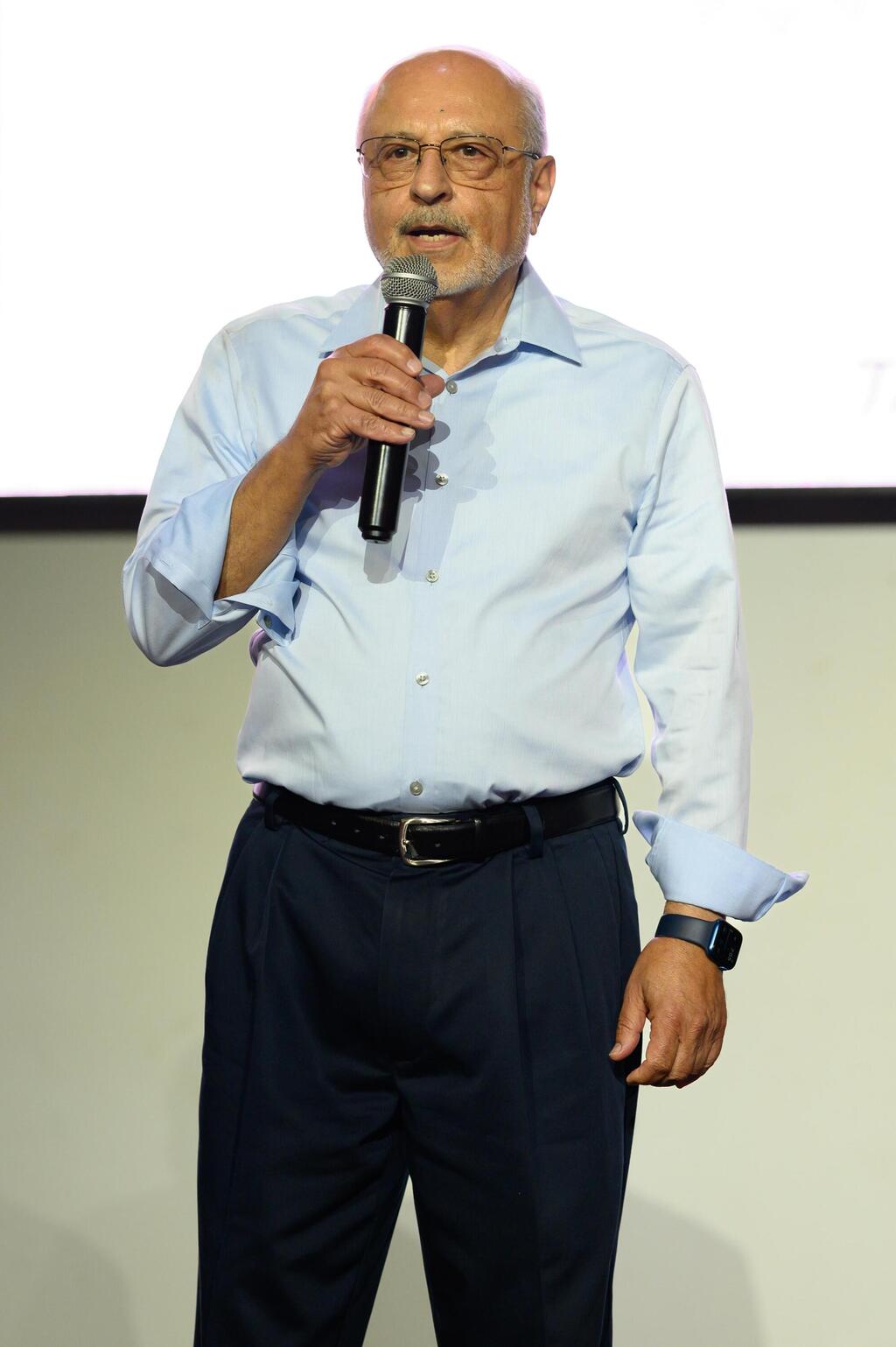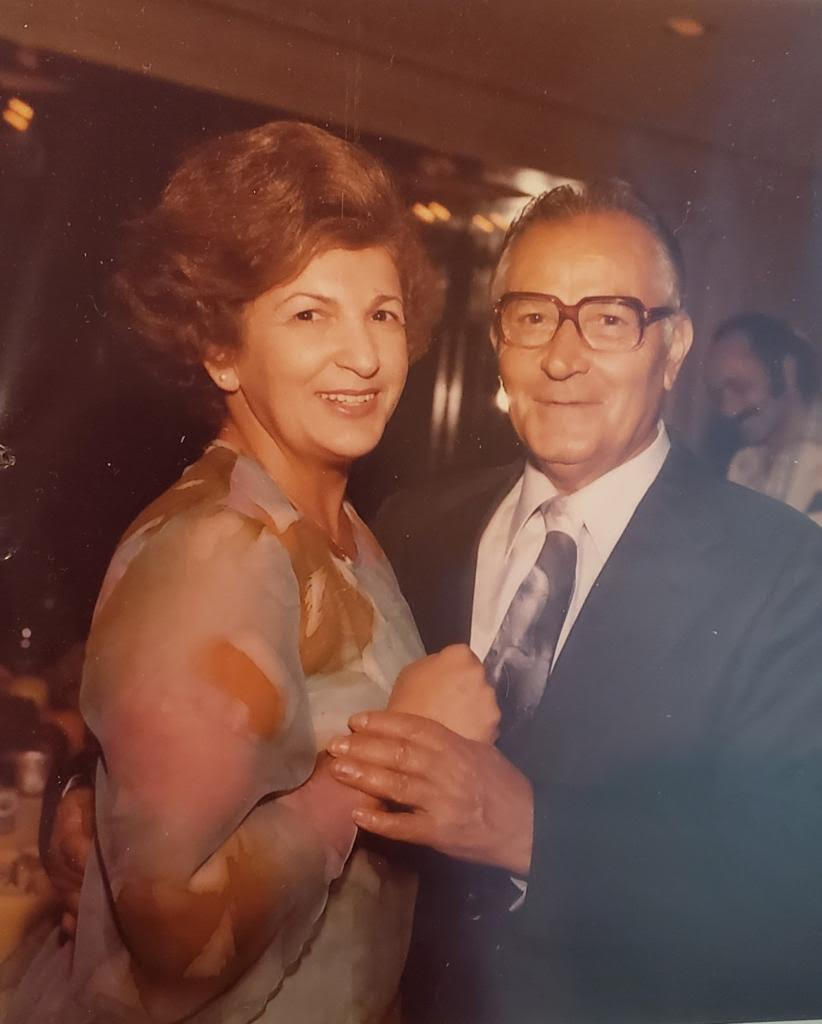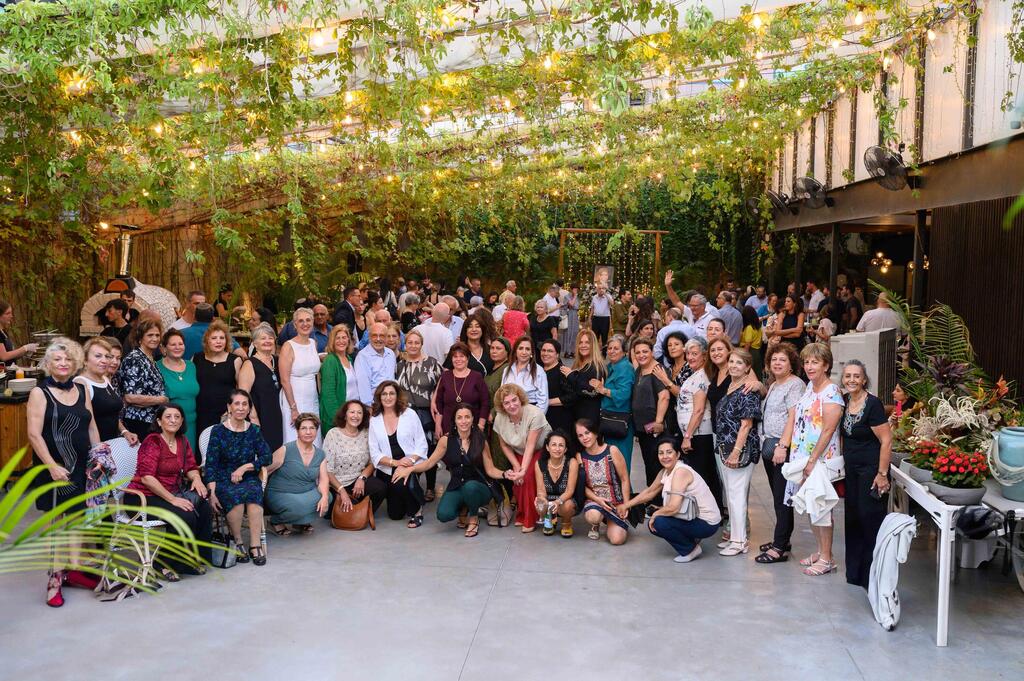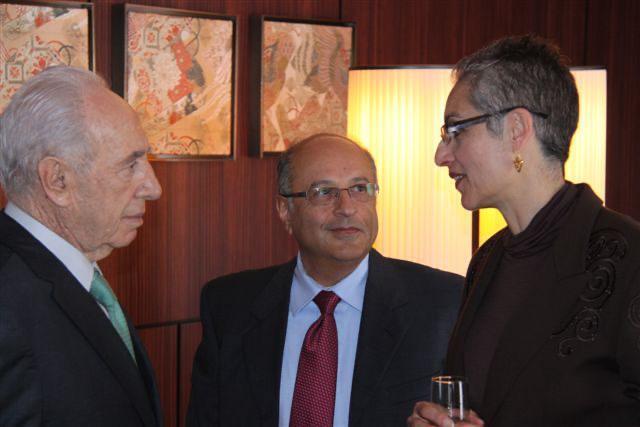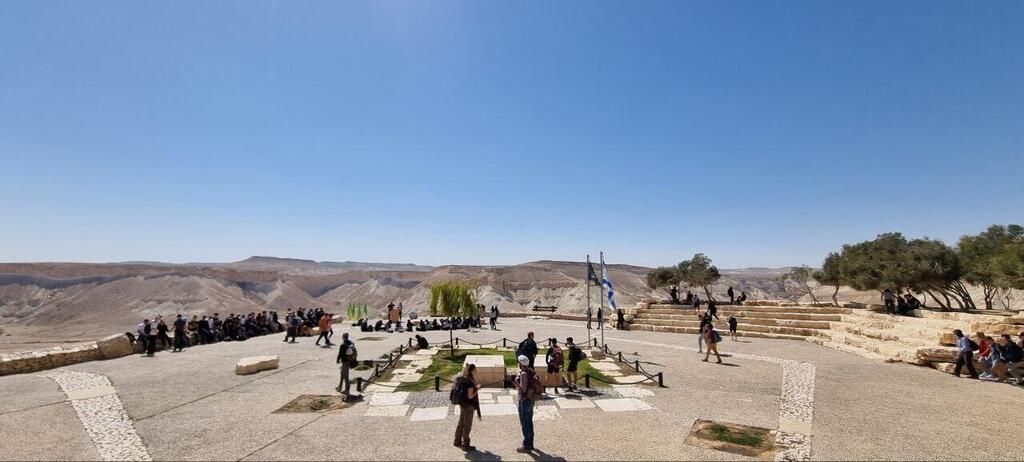"When my father, André, who was born and raised in Iran as a Jew, would go to school and get smacked on the head by Muslims, he used to say, ‘Don’t mess around with the Jews.’ For me, that’s a saying that every Jew in the world should adopt always, especially these days. It’s not easy to be Jewish and Israeli, but Israelis are a symbol. Jews around the world need strong Israelis and vice versa,” says David Merage, owner and manager of Consolidated Investment Group (CIG), which invests in real estate and capital markets in Denver, Colorado, and the Merage Israel Foundation, a family philanthropic foundation.
In an interview with Ynet during a visit to Israel for a memorial event for his mother, the late businesswoman and philanthropist Katherine Merage, and in light of his increased activities in the country following Operation Iron Swords, Merage shared his personal story, from his childhood in Iran, through his arrival in the U.S. and his rise to become a successful and wealthy businessman, to his deep connection to Israel in general and the Negev in particular, and the establishment of the foundation inspired by David Ben-Gurion's vision.
Bat Mitzvah at age 78
"My mother passed away about two months before her 100th birthday,” Merage said at the memorial event held in Tel Aviv, attended by businesspeople and leaders of philanthropic organizations. “When we realized that she probably wouldn’t make it to her birthday, we decided to bring the celebrations forward, and so we did. We are here today to celebrate her life.”
He also shared how, over the past 30 years, every visit he made to Israel was accompanied by two women: his mother and his wife, Laura, who were full partners in his projects in Israel. “Often, daughters-in-law and mothers-in-law don’t get along. That wasn’t the case with us. I admire what these two women did together here".
What do you remember from your childhood?
"A Jewish home within a Muslim environment. My grandmother and mother preserved Judaism; they were lionesses. My mother wasn’t afraid of anyone; she was committed to the Jews, Judaism, and Israel. She worked hard, and no one could tell her no. She left Iran in 1974 for Los Angeles, and my father followed her there.
At age 75, she decided she wanted a Bat Mitzvah celebration and began learning Hebrew. She celebrated her Bat Mitzvah at the age of 78. She created a crazy trend in Denver of elderly people celebrating Bat and Bar Mitzvahs. She touched the lives of thousands, made many people change their lives, and did it with great compassion and always with calm."
He says he doesn’t miss Iran, he has memories from there, but it belongs to the past. His life now is divided between the U.S. and Israel, which represent the present and the future.
"Katherine is the real reason I married David,” Laura Merage shared with the audience with a smile. “I was a 7-year-old girl in Iran, where I was born and raised when I decided to fast fully on Yom Kippur, despite my mother’s pleas. Towards the end of the fast, I fainted in the synagogue. Among the women who helped me was Katherine, who looked at me and said, ‘I wish this girl would marry one of my sons."
David's father André, 74, left Iran when he was 15. They live in Denver, Colorado, and are parents of two, with three grandchildren. Their son Jonathan lives in Israel and invests there, while their daughter Sabrina lives with her family in Los Angeles. “We met at my sister’s birthday party. Laura had just moved there from Iran. About two years later, the connection was renewed. We became good friends, friendship turned into romance, and in 1978 we got married,” he recalls several decades back, his eyes still sparkling.
"I left Iran for England,” he recounts. “After two years, I joined my brothers in the U.S., who were already living there. My father, who grew up in a poor family, was an outstanding student. He was among the first to attend the Alliance school, and they sent him to Paris. He dreamed of becoming a dentist, but because the family had no money, he quit school at 16, started working to help support the family, and pulled them out of poverty. But then World War II broke out, and when the Germans arrived in Paris, he left everything and moved back to Iran, where he started from scratch."
"I remember him working hard all his life. When Khomeini came to power, he lost his money again and had to start over. He wanted us to return to Iran, but we refused. Eventually, the whole family moved to the U.S. From my father, I learned the importance of hard work and being a good businessman. From my mother, I learned how important it is to help Jews and Israel. That’s why my life is divided into 50% business and 50% philanthropy. After Laura and I visited Israel several times, we decided to invest there and established the Merage Israel Foundation (MFI), which focuses on the development of the Negev. We don’t feel like tourists here but part of the country. My family’s love for Israel is immense."
We are talking in a week when Ismail Haniyeh, a senior Hamas leader, was assassinated in a targeted killing in an apartment in Tehran. This is yet another chapter in the Iran-Israel relationship, which has seen many ups and downs over the years and is currently at a low point. It is worth mentioning that last April, Israel was reportedly behind an attack on the Iranian consulate in Damascus in which a senior Iranian official was killed, and in response, Iran fired hundreds of missiles at Israel.
"As someone who was born and raised in Iran, I am saddened by Iran’s aggression toward Israel. I really hope that one day we can build a good relationship between the two countries", says Merage.
Recipe for success
Merage made his first fortune from the company “Chef America,” which he founded with his brother, specializing in microwaveable food. “My father suggested that the three of us brothers work together. One of us was always involved in real estate and was very successful. My brother Paul and I started working together. We didn’t think we would start a food company, but we understood that it was the need of the hour. We built everything from scratch on our own: designing the machines, sales, marketing, constructing the buildings. We called one of our products ‘Hot Pockets,’ which became our flagship product. In the beginning, our father invested in us, and we brought the company from zero sales to an annual turnover of $750 million and 2,000 employees. It was one of the fastest-growing food companies in the world. Our goal was to grow by at least 15% each year and to always improve the product’s quality. That’s what we did for almost 30 years until we sold the company to Nestlé".
What led you to think of the product?
"Chef America was founded out of necessity. It was 1975. Women in the U.S. started joining the workforce, and their husbands were working. Families began experiencing difficulties with hungry teenagers, especially boys. They would come home from school and ‘raid’ the kitchen or settle for sandwiches. There was no home-cooked, nutritious food waiting for them. So we started creating a product just for them, something frozen, quick to prepare, and nutritious. An oven wasn’t an option for us because hungry teenagers wouldn’t wait even 10 minutes for their food to heat up.
We also didn’t want them starting fires. At that time, the microwave was entering the market, and we began experimenting with different products, seeing what happened when they were heated. We succeeded in developing a product that became hot and crispy in under three minutes. It became a huge success, and mothers loved it. Later, we developed frozen snacks like mini pizzas and croissants. In the end,” he laughs, “the husbands ate them too. Later, we developed products that were more suitable for women and the whole family."
In August 2002, Nestlé purchased Chef America for $2.6 billion. “The recipe for success is to surround yourself with excellent people, give them independence, responsibility, and respect, and lead them with honesty and trust,” he says. “Then and now, as managers, we don’t like to hear ‘no,’ but believe that we can do anything."
The sale to Nestlé took place when his brother and he felt it was the right time. According to him, the exit allowed him to focus on other businesses and philanthropy, and more than anything, it made him happy because it allowed him to spend more time with his family and children, which was missing before due to the pressures of work.
Working for social change
After the acquisition, Merage decided to dedicate more of his time to philanthropic initiatives. He then launched the Consolidated Investment Group (CIG), and about 25 years ago, together with his wife, he established the Merage Israel Foundation. To date, among other projects, the foundation has supported the establishment of the Merage Medical Center in Dimona and a health and rehabilitation center in Sderot. The foundation also promotes employment and entrepreneurship and supports dozens of festivals and cultural events in the Negev.
Reflecting on his birthplace and childhood, Merage created programs for women’s leadership and the exposure of Persian culture to Israeli society. Today, this initiative serves as an empowerment framework for hundreds of Iranian women, with clubs spread across the country. Additionally, there are national programs established and supported by the foundation, such as “Wings,” which assists lone soldiers in partnership with the Jewish Agency, and “Connected for Life,” established in 2017 to bridge the technological gap between the younger and older generations and to combat loneliness.
In 2020, the foundation launched two new ventures: wine and agricultural tourism in the Negev, an idea conceived by Nicole Hod Stroh, the foundation’s CEO, and DeserTech, which promotes the development and commercialization of technologies that address the challenges of arid and desert environments. “The philanthropic investments of the Merage family, led by my wife Laura and me, focus on social change to improve the quality of life for children, families, and communities, inspired by the vision of David Ben-Gurion, who was a close friend of my father,” he explains.
Merage shared that this year was supposed to be a year of celebrations for the foundation, marking 25 years of activity in Israel. However, the events of October 7th changed those plans, and instead, the foundation began increasing its activities and assistance to the communities and populations affected on that dark Saturday and in the subsequent war. “Since October 7th, we have increased our investments in the Negev, and we will continue to do so, without fear and with great faith. I believed then, and still believe now, that the Negev is the key driver of Israel’s growth."
This year, you established a new foundation to combat antisemitism
"That’s correct. After October 7th, I witnessed the intense rise in antisemitism, both globally and particularly in the U.S. I sat down with Laura and our daughter and said, ‘Never again is now.’ We cannot allow another Holocaust to happen. So, we established the Merage Foundation to Combat Antisemitism. I invested a significant amount of money in the new foundation, which will address this issue in the U.S. Laura’s mission is to strengthen the Jewish community and public opinion regarding Israel."
"I was born and raised in Tehran in a Zionist family,” shares Merage, telling her own story. She is a successful artist who also founded several philanthropic organizations that influence and shape the art and culture scene in Denver. “My grandfather, who was a historian of the Jewish people in Iran and took great pride in Jewish culture, was a close friend of David Ben-Gurion. They used to exchange letters. We were raised with the understanding that it was frightening to grow up in Iran, and that only a strong Israel would ensure our safety in Iran."
"I remember visiting Israel as a child; it was the only place I felt safe. I didn’t have to worry about who was walking behind me or who might appear from the side, unlike in Iran, where I wasn’t allowed to walk the streets. When I was 15, I insisted that my parents send me to the U.S. During my childhood, I experienced several antisemitic incidents. One of them, which I remember to this day, happened when I was six years old. I remember people standing outside a hospital where injured Jews were brought, shouting, ‘Kill the dirty Jews.’ I was at my aunt’s house then, hiding under the bed. That traumatic memory, which had been repressed, resurfaced after October 7th. Someone I considered my best friend for 50 years abandoned me after October 7th, just because I am Jewish. My work with the foundation is also for future generations. Only a strong Israel keeps us safe."
“Not a typical foundation that just writes a check”
"Laura and I are committed to creating impact,” he adds. “For many years, we didn’t talk about ourselves, keeping a low profile. There is hardly any information about the Merages. We don’t need to impress anyone; we simply do. We will do everything to ensure that Israel becomes a strong nation. Is it easy? No. But we remain committed to our goal."
Put your finger on the secret of your connection to Israel
"It’s something stronger than any explanation. Until the age of 40, I hadn’t visited Israel and only listened to my mother, who constantly spoke about it. We are not a traditional family, but we always observed Shabbat and holidays. I became a Zionist after my visits to Israel, and today my grandchildren attend a Jewish school in the U.S., which connects them to Jewish culture and tradition."
Let’s return to the Negev. When did your love affair with it begin?
"During one of our first trips to Israel, Laura and I wrote on a napkin: Tel Aviv has abundance, Jerusalem is amazing. And the Negev? Nothing. Why? We met wealthy people, leaders, and asked them about it. They all answered, ‘We were there in the army; there’s nothing there.’ During that time, we met Ariel Sharon, of blessed memory, before he became Prime Minister. He took us on a tour and asked us to help him in the Negev. I replied, ‘What are you talking about? I don’t speak Hebrew, and there’s nothing here.’ He asked his advisor at the time, Ilan Cohen, to meet with us. We met with him and Shimon Peres. We planned, wrote, and formulated a strategy. At some point, I realized I had to do the work myself".
Meaning?
"First of all, to present the Negev to Israel. For example, we have held dozens of festivals and events to bring Israelis to the Negev, and we paved bike trails. We realized that even Israelis don’t know the abundance that exists in the Negev. In the end, I’m an entrepreneur. I take risks, go to places where no one else wants to go. Maybe there’s a kind of ‘madness’ in me that connects the different chapters of my life—from founding a food company from scratch, through philanthropy, to coming to Israel and investing in the Negev. When Ariel Sharon brought me to the Negev, no one wanted to invest in it, even though it’s the perfect place for entrepreneurs to thrive. We are not a typical foundation that just writes a check and says goodbye. We manage our programs ourselves. We wake up in the morning for this. It takes money, but also commitment, and that’s what we bring with us. It’s not an exaggeration to say that we are a foundation that changes Israeli society. I believe that in 25 years, the Negev will continue to maintain its uniqueness and character, and many more people will live there".
What’s next?
"Laura and I will be here more and more. Our son also lives here. I feel most at home here, and that I need to be here more, together with you. My late mother planned her estate. One of the portions will be managed by me and dedicated to Israel. I am planning major projects that will change the reality for all the residents of Israel, particularly in the south. We will invest in infrastructure that will provide critical and essential services to thousands of Israeli citizens. Our commitment to Israel will remain forever".


